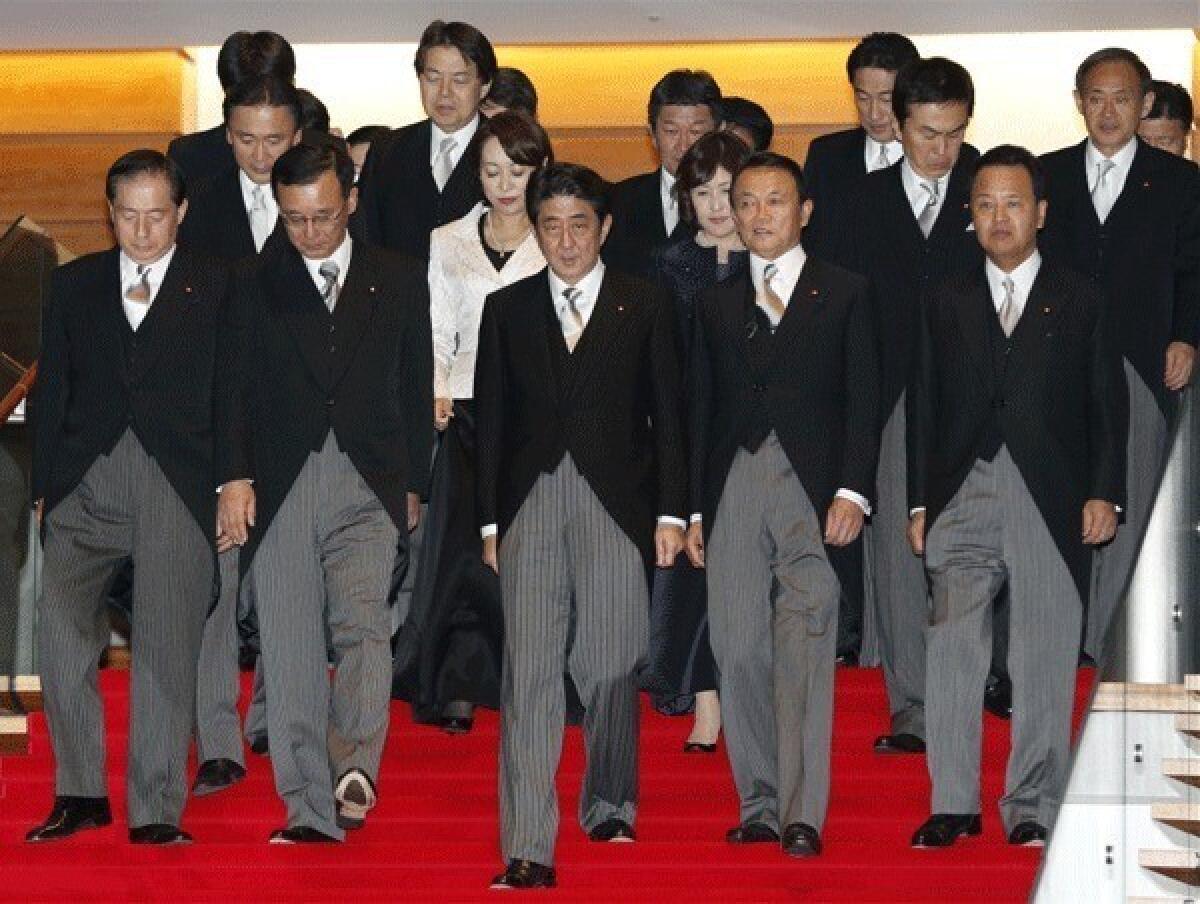A militarized Japan?

- Share via
Japan’s new prime minister, Shinzo Abe, has announced plans to revise his country’s famous pacifist constitutional provision, Article 9, which renounces “war as a sovereign right of the nation.”
On the surface, Abe’s proposal may seem merely symbolic, suggesting that he simply wants to add an explicit recognition of the country’s right to military self-
defense. Since Japan has long maintained “self-defense” forces, the predictable expressions of concern in foreign capitals may seem overblown.
But this high-visibility change is only a small part of a sweeping constitutional revision proposed by Abe’s resurgent Liberal Democratic Party. The proposed draft authorizes the parliament to declare a military emergency during which Cabinet decrees would have the force of law. It also rewrites a provision to eliminate the constitutional ban on military conscription.
The proposed revision radically redefines other basic commitments. Article 97 of the constitution now declares that “the fundamental human rights … guaranteed to the people of Japan are fruits of the age-old struggle of man to be free; they … are conferred upon this and future generations in trust, to be held for all time inviolate.” The LDP would erase this statement of principle.
Worse, the draft emphatically declares that “a citizen may not abuse his rights and freedoms. He should be aware of his responsibility and obligation to the community and exercise his rights in a way that does not conflict with the public interest and public order.” This would replace a moderate limitation clause in the constitution.
Even fundamental political liberties are put at risk. A new provision would put citizens on notice that they cannot exercise their freedom of speech or association “for the purpose of harming the public interest and public order.”
These proposed changes are far more serious than a symbolic assertion of a right to collective self-defense. The LDP is proposing to build the foundation for an authoritarian and militarized Japan. Will it succeed?
The constitution has a rigorous ratification process for changes. First, any amendment must be approved by two-thirds of both houses of the parliament and then by the people in a special referendum. Abe may be planning to change the supermajority requirement.
But lowering the bar may not be necessary given the smashing victory of the LDP and other nationalist parties in the recent elections for the lower house. A newspaper survey of its newly elected members suggests that more than 70% support revision of the pacifist clauses, though it isn’t clear whether the entire LDP draft commands comparable support.
The next big test will come in the July elections for the upper house. If the right wing wins big again, the constitutional revolution will move into high gear.
For the moment, the Japanese public seems cool to Abe’s project. A recent poll, for example, reported that only 32% were in favor, with 53% opposed, to a change in Article 9’s commitment to peace. The sweeping right-wing victory owed more to the previous government’s failure to deal with Japan’s economic difficulties and its tragic nuclear crisis.
Nevertheless, Japan’s politics are in a remarkably fluid condition. With seven prime ministers in six years, it would be foolish to make predictions. This is the second time Abe has been prime minister. He rose to power in 2006 with similar constitutional ambitions, and his government collapsed a year later. But history may not repeat itself.
Only one thing is clear: Human rights groups throughout the world should mobilize public opinion against the LDP’s constitutional revolution.
So far as governments are concerned, this should be a period of watchful waiting. Heavy-handed condemnations of the Abe government would only provoke nationalistic backlash. After all, Japan’s constitution was promulgated during the U.S. military occupation, and it is perfectly appropriate for the current generation to take ownership of its foundational text. The diplomatic challenge is to respect the sovereign rights of the Japanese people without helping the current government consolidate its grip on power.
In practical terms, this means President Obama should reject all efforts by the Japanese government to take a more prominent military role in its long-standing alliance with the United States. Given America’s strapped financial condition, it may well make sense to restructure Pacific relationships over the long run. But now is not the time. Obama should wait for the dust to settle and see whether the Japanese people build upon, or repudiate, their postwar experiment in liberal democracy.
Bruce Ackerman is a professor of law and political science at Yale. Tokujin Matsudaira is an assistant professor of law at Teikyo University in Tokyo.
More to Read
A cure for the common opinion
Get thought-provoking perspectives with our weekly newsletter.
You may occasionally receive promotional content from the Los Angeles Times.










